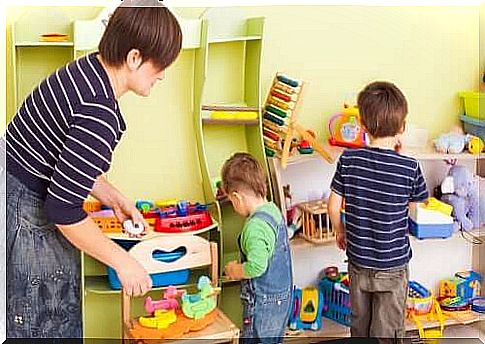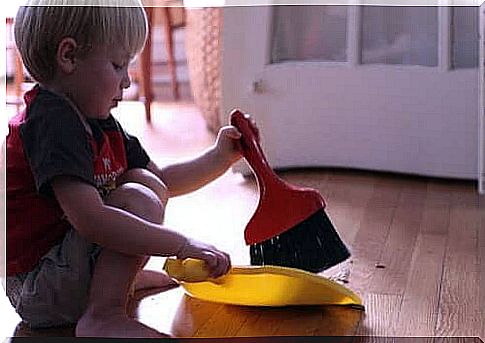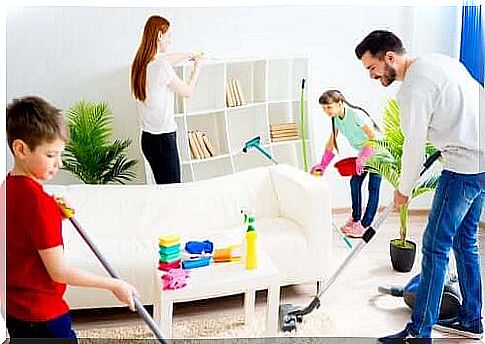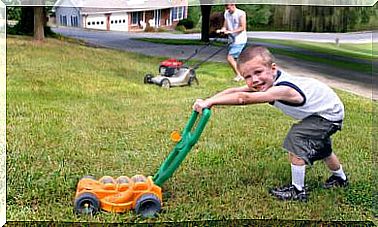How To Motivate Children To Collaborate At Home?

Being able to motivate children to collaborate at home is a challenge that many families have to deal with every day. Parents often decide to do household chores themselves in order to avoid conflicts with their children. However, did you know that collaborating with household chores promotes the learning of values and skills for children?
Collaborating at home benefits children
Philosophy and Education Sciences graduate Joseph Knobel believes that the importance of children’s collaboration in household chores lies in the fact that these will be their first responsibilities in life.
The importance of children collaborating at home is not just about keeping a clean and organized home, but also about teaching values and skills that will be very useful for the future:
- Responsibility. Although they don’t like doing household chores, children will feel more responsible when they successfully complete a task, realizing that the feeling of satisfaction is so comforting.
- Ability to negotiate. Know how to present your ideas, communicate clearly and try to reach an agreement.

- Team work. Learn that sometimes, to achieve a goal, it is necessary to cooperate with others.
- Sensitivity and empathy. When your kids help you with cleaning, they discover and understand the hard work required to take care of a house.
- Independence. By collaborating at home, they will learn to do household chores efficiently for the future.
According to bestselling author Dan Pink, household chores are good for children because they show that families are based on mutual obligations and that, ultimately, family members need to help each other.
Five Ways to Motivate Children to Collaborate at Home
1. Start the task with them
One of the most frequent mistakes parents make is expecting their children to know how to do chores, either because of its simplicity or because they believe their children have seen the chores done.
Often, the only thing children need to start collaborating at home is for their parents to teach them how to do household chores.
For example, collecting toys from the bedroom may at first seem like a simple task. However, your child may not know where to put them correctly, which is likely to frustrate him, and eventually he will decide not to.
So instead of scolding him, try asking him if he needs help. The trick is to help him get started and, little by little, let him finish.
2. Everyone must have responsibilities
One of the most important aspects when it comes to educating a child to carry out household chores is the division of responsibilities in the family.
Children should realize that all members of the family have their own responsibilities, without a doubt depending on the abilities of each one.
It is important to know how to choose the appropriate tasks that we want to assign to children. For example, choosing a task that is too complex for your age can be frustrating, while an overly easy task will end up being tedious.
3. Let them be more and more autonomous
Just as in a company where the boss does not give space to the employees’ opinion, their autonomy is nullified, in the family environment, the same happens.
It is essential to give children the opportunity to express their opinion. By allowing them to say what they think, self-confidence is fostered and, little by little, a sense of self-reliance is formed.
As they feel more autonomous and independent, children will feel more motivated to take on household chores and do them much more effectively.
4. Teamwork
Make sure that when you want your children to do a household chore, it coincides with a time when everyone in the family is working together at home.
Your child will feel part of something bigger. Thus, when working as a team with the family, your motivation to collaborate will increase. Also, by doing this together, you will make sure the housework is done correctly.

5. Make collaborating at home just another habit
Teach from childhood the importance of collaborating at home. Little by little, children will assume and normalize their responsibilities so that they finally become a habit.
If you set a specific weekly time to be devoted to organizing and cleaning the family home, you will be building a family habit together.
That way, your child will understand that collaborating with household chores is necessary. And, finally, you will see this as a routine, as something normal, as all family members collaborate to keep the home running smoothly.
It also benefits the family union.
Finally, motivating children to collaborate at home can also help build stronger family relationships. Sharing tasks and responsibilities will ease family burdens and tensions, which will reduce family stress.
In short, if we motivate children to collaborate at home with household chores, they will feel part of something bigger than themselves, while learning valuable skills for the future.







